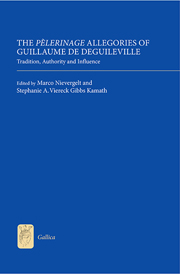Book contents
- Frontmatter
- Contents
- List of Illustrations
- List of Contributors
- Acknowledgements
- Abbreviations
- Introduction
- Part I Tradition
- Part II Authority
- Part III Influence
- 7 Remembered Pèlerinage: Deguileville's Pilgrim in Philippe de Mézières's Songe du Vieil Pelerin
- 8 La réception espagnole de Deguileville: El Pelegrino de la vida humana
- 9 Body Trouble: The impact of Deguileville's Allegory of Human Life on Croatian Renaissance Literature
- Bibliography
- Index
8 - La réception espagnole de Deguileville: El Pelegrino de la vida humana
from Part III - Influence
Published online by Cambridge University Press: 05 December 2013
- Frontmatter
- Contents
- List of Illustrations
- List of Contributors
- Acknowledgements
- Abbreviations
- Introduction
- Part I Tradition
- Part II Authority
- Part III Influence
- 7 Remembered Pèlerinage: Deguileville's Pilgrim in Philippe de Mézières's Songe du Vieil Pelerin
- 8 La réception espagnole de Deguileville: El Pelegrino de la vida humana
- 9 Body Trouble: The impact of Deguileville's Allegory of Human Life on Croatian Renaissance Literature
- Bibliography
- Index
Summary
Résumé en anglais/Abstract in English
The Castillian prose translation of PVH1, El pelegrino de la vida humana, underwent a number of transformations before even appearing in the workshop of Henrico Mayer Aleman in Toulouse, where it was eventually printed in 1490. The Spanish version is based on a French printed prose adaptation of PVH1, produced in Lyon by Mathis Husz in 1485 and reprinted in 1486, itself based on an anonymous prose adaptation of PVH1 produced for Jeanne de Laval in Angers in 1465. The translator is identified in Mayer's print as Vinçente de Maçuelo, who appears to have had close connections with the Dominican order and the university of Toulouse on the one hand, and with the Royal family of Castile and Aragon on the other. Indeed, a copy of Mayer's print was acquired by the Royal Family in 1492, presumably for the spiritual education of the young Prince John, whose training was entrusted to a fellow Dominican, Diego de Deza. The connections between Mayer, Maçuelo, the Dominican order and the Royal Family thus provide the main context for the reception of this work in Spain. Mayer's print also lends the text a more militant, combative tone, notably with the addition of a full-page frontispiece woodcut showing a hybrid figure of a pilgrim-knight. This addition may have heightened the book's appeal for an aristocratic readership, allowing the volume to serve as a ‘mirror for princes’ within the court.
- Type
- Chapter
- Information
- The Pèlerinage Allegories of Guillaume de DeguilevilleTradition, Authority and Influence, pp. 171 - 188Publisher: Boydell & BrewerPrint publication year: 2013

